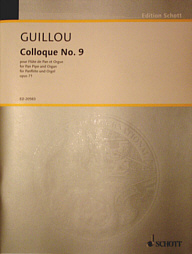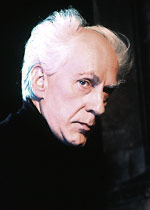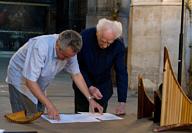 |

SCHOTT ED 20583
Price inkl. tax.:
Euro 24.95
Samples:
Ulrich Herkenhoff - Panflute Jean Guillou - Organ
1
- 2
- 3
|
 |
 |
 |
 Jean
Guillou was born on 18 April 1930 in Angers. He developed
a strong affinity to the organ at an early age. Guillou began
his organ studies at the Paris Conservatoire with Marcel Dupré
in 1945 and additionally took courses in compositional analysis
with Olivier Messiaen and harmony with Maurice Duruflé.
In 1955, he was appointed as Professor at the Istituto de
Musica Sacra in Lisbon. In 1958, Guillou took up residence
in Berlin before returning to France on his appointment as
titular organist in the principal church of St Eustache in
Paris. He participated in the annual master classes in Zurich
as professor of organ improvisation and interpretation from
1970 to 2005. Guillou became one of the leading international
organists due to his technical ability and individual capacity
for improvisation. Through his extraordinary intuition for
registration and rhythm, the composer gained a particular
reputation for the interpretation of Johann Sebastian Bach
and has repeatedly performed Bach’s entire works for
organ in numerous concert cycles. Guillou also gained an international
reputation as a pianist. He revived the long forgotten piano
sonata by the Liszt pupil Julius Reubke. Guillou is the author
of a variety of books on music including “L’Orgue,
Souvenir et Avenir” and “La Musique et le Geste”.
He has also been in great demand as an organ building consultant
thanks to his expert knowledge. He has provided designs for
a number of well-known instruments such as the organs of the
Tonhalle in Zurich and the Auditorio de Tenerife. Jean
Guillou was born on 18 April 1930 in Angers. He developed
a strong affinity to the organ at an early age. Guillou began
his organ studies at the Paris Conservatoire with Marcel Dupré
in 1945 and additionally took courses in compositional analysis
with Olivier Messiaen and harmony with Maurice Duruflé.
In 1955, he was appointed as Professor at the Istituto de
Musica Sacra in Lisbon. In 1958, Guillou took up residence
in Berlin before returning to France on his appointment as
titular organist in the principal church of St Eustache in
Paris. He participated in the annual master classes in Zurich
as professor of organ improvisation and interpretation from
1970 to 2005. Guillou became one of the leading international
organists due to his technical ability and individual capacity
for improvisation. Through his extraordinary intuition for
registration and rhythm, the composer gained a particular
reputation for the interpretation of Johann Sebastian Bach
and has repeatedly performed Bach’s entire works for
organ in numerous concert cycles. Guillou also gained an international
reputation as a pianist. He revived the long forgotten piano
sonata by the Liszt pupil Julius Reubke. Guillou is the author
of a variety of books on music including “L’Orgue,
Souvenir et Avenir” and “La Musique et le Geste”.
He has also been in great demand as an organ building consultant
thanks to his expert knowledge. He has provided designs for
a number of well-known instruments such as the organs of the
Tonhalle in Zurich and the Auditorio de Tenerife.
Since 2004, the works
of the organist composer have been exclusively published by
Schott Music, including symphonic works and compositions for
smaller forces such as the text and organ fantasy Alice aux
pays de l’orgue [Alice in Organ Land] for organ and
narrator. Guillou’s often technically highly demanding
organ compositions go well beyond the traditions of the French
organ symphonies of the late 19th and early 20th centuries
and can be categorised as standing between the poles of a
poetically deeply felt message and a dynamic development.
Here the organ appears to be completely liberated from its
traditional role as a “sacred” instrument and
becomes the intermediary of imaginative and even fantastic-enigmatic
content. The organ concertos with orchestral accompaniment
run through all the creative phases of the composer as a leitmotif,
beginning with the Inventions from the year 1960 and the Concerto
2000, composed on the occasion of the new millennium up to
the Concerto N°7 (2007). The instrumentation of the accompanying
orchestra varies from work to work. Concerto N°3 (1963)
for example is accompanied by a string orchestra, whereas
the Concerto N°5 with the poetic sub-title “Roi
Arthur” astonishes with the tonal colour of the brass
ensemble which accompanies the organ in this work.
Guillou has augmented
the organ repertoire with a large number of transcriptions
of orchestral works. The arrangements of Mussorgsky’s
Pictures at an Exhibition and Tchaikovsky’s Scherzo
from the Symphony No. 6 reproduce the extraordinary orchestral
complexity of the original works despite being performed by
a single musician sitting at the organ console.
Guillou is the recipient
of awards such as the Prize of the Liszt Academy in Budapest
(1982), the International Performer of the Year Award (1982)
and the Diapason d’Or and Prix Choc du Monde de la Musique
(1991).

Ulrich Herkenhoff and Jean Guillou at the first rehersal in
St. Eustache, Paris 2009
|
 |
 |
 |


Order

Top |
 |
